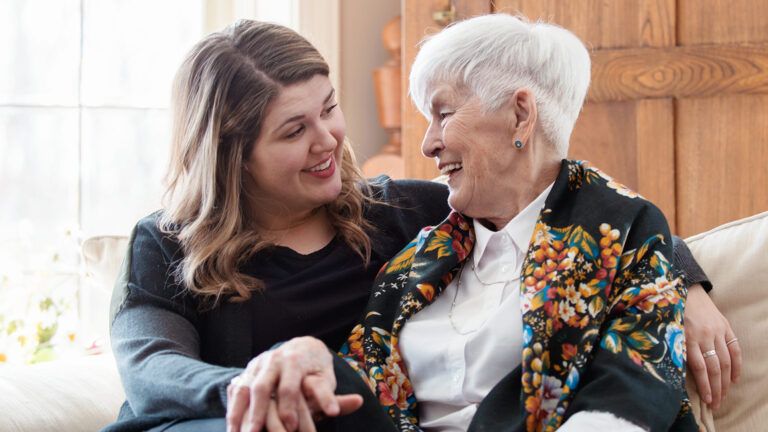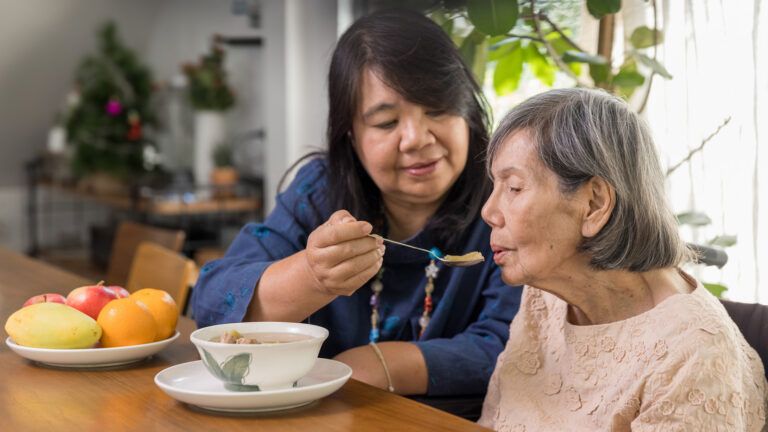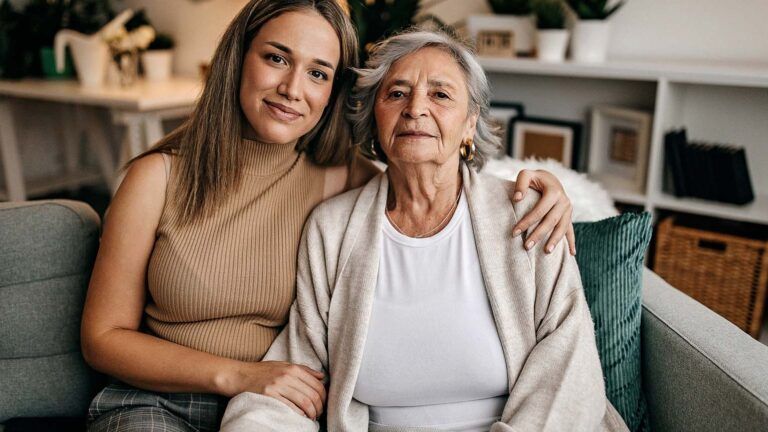Father’s Day is traditionally a celebration of the past and the present. But happy memories can be tinged with feelings of loss, and planning for enjoyable ways to mark the occasion can trigger stress when your dad has Alzheimer’s or another dementia. As your dad’s caregiver, however, there is much you can do to help bring about a positive, calming experience for both of you. This is true whether you live in the same residence and will be together there, or you’re holding a virtual get-together, due to Covid-19 social isolation measures.
The main idea is to wrap the day around whatever it is that will bring your dad a sense of peace and make him feel comfortable, Lori La Bey, CEO and founder of Alzheimer’s Speaks, told Guidposts.org. By remaining relaxed and in the present and tailoring the day to your dad’s specific interests and needs, you can minimize stress on yourself as a caregiver and on him, as well.
La Bey made the following suggestions to help you plan for a successful celebration of all that you have shared with your dad:
1. Do things the two of you have enjoyed in the past
“It could be an old ballgame, or going for a walk,” she said. “Maybe it was just sitting and watching TV or old movies.” If your dad loved working on cars, for instance, you could buy a book on his favorite makes and models and use it to reminisce together.
2. Show up in a positive and calm state
People who have dementia pick up on nonverbal emotional cues, La Bey said. So, if you’ve been stressed or sad while planning for the day, your dad will likely notice, whether you’re together in person or virtually. To avoid going into Father’s Day feeling rushed and overwhelmed, it’s of primary importance to get enough sleep and to slow your pace down.
3. Keep it simple
“It doesn’t have to be big and fancy,” La Bey said. “It’s not about beating out the Joneses.” What matters is getting to the heart of your relationship and what satisfies both of you in the moment, whether it’s cooking a meal you both love or dancing to favorite music together. If your dad is in a more advanced stage of Alzheimer’s, it may be that he can’t enjoy things like this. “Then it’s about could he use a blanket, could he use a plant—something he can smell?” she said. If you’re celebrating from a distance, it’s nice to drop off a card and his favorite foods and then to have a conversation via Zoom or FaceTime, so that he can see your face and read the nonverbals.
La Bey said it helps to always remember three questions when it comes to your dad: Is he safe? Is he happy? Is he pain-free? “Those are really our basic life needs,” she said. If the answer to all three is yes, you can more easily find contentment in even the most simple and silent moments.
4. Consider a gift of music or home care help
The gift of a music therapist could be a wonderful think-outside-the-box gift, even if the sessions have to be virtual for now, La Bey said. “Music is very, very calming,” she said. She also suggested the websites Coro Health and Music Memories with Barbara Lee and Friends, both of which have therapeutic music offerings.
Hiring an in-home caregiver could be another great gift, with tremendous value to both your dad and to you as the family caregiver, La Bey said. “It might not start on Father’s Day, but it might be something that the family can plan as this is going to be a gift and this is how it’s going to work,” she said. “Home care can do a lot of different things, from medical needs to personal grooming to just being a companion.” If your dad is uneasy about having a stranger in the house, she said, it can help to be there while he has time to get to know the new caregiver. Once trust has been built and he feels more comfortable, you may also feel better about taking care of other things you need to do, or simply taking a nap if you’re exhausted.
Ask your dad’s doctor about whether it’s a good idea to bring someone in the home now to help and ask about the safety protocols at any agency you contact. If you can’t hire someone now, this may be a good time to begin research options for the future.
5. Celebrate the present moment
A sense of peace can come from accepting where your dad is right now—something La Bey said she learned while caring for her mother. One day, she was digging through a box of old photos and ran across one that showed her with her mom and dad on her wedding day. “I thought about what had happened when we called my parents to say that we were getting married,” she said. “We thought that we were having this little backyard wedding when we talked to my parents.
My mom called back 20 minutes later and she had the church, the hall and the menu all figured out, and I loved that about her. What I realized in that moment was that on an unconscious level, I still wanted her to be that person. And I looked at the picture and realized that my dad was dead, my mom had dementia and I was divorced. Yet unconsciously, I wanted to hold her in this place and time. It helped me to accept that we’ve all changed, and that’s okay.”
Developing the ability to embrace joy in the present moment, La Bey said, is one of the “brilliant lessons” we can learn from our loved ones who have dementia.






